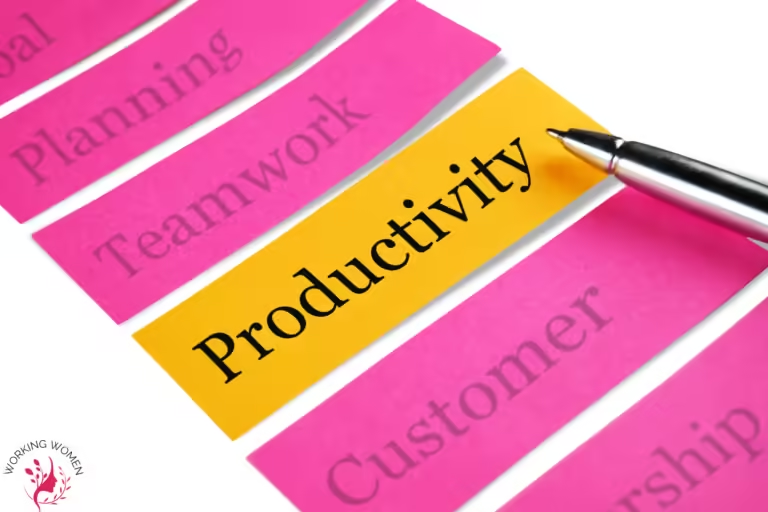Sleep Deprivation: The Productivity Killer for Working Moms
Did you know that nearly 70% of working moms regularly experience sleep deprivation? If you’re one of them, ever wonder how those missed hours of sleep are silently sabotaging your career? Sleep may seem like a luxury for working moms, something sacrificed to squeeze in a few more work hours or precious moments with their families.
But this hidden cost is steeper than we realize. Lack of sleep erodes our focus, creativity, and resilience, the very skills we need to excel in our careers. From missed deadlines and foggy decision-making to short tempers that strain work relationships, the consequences for working moms are very real.
Table of Contents
What is Sleep deprivation?
Sleep deprivation hits working moms especially hard. They battle early wake-ups, interrupted nights, and the constant struggle to balance the demands of work and motherhood. Between the mental load of family management and societal pressures to “do it all,” sleep often gets relegated to the bottom of the priority list, leading to a chronic sleep deficit that takes a toll on their well-being and productivity.
sleep deprivation mean
Sleep deprivation is when a person fails to obtain enough sleep for their body’s needs. It can be either acute (Short-term) lasting one or few nights or Chronic (long-term) where insufficient sleep continues for weeks, months, or even longer.
Science behind Sleeplessness
Sleep Deprivation Stages
Everyone experiences deprivation of sleep differently. Even shorter periods of missed sleep have negative consequences on health and performance.
- Stage 1: 24 Hours Awake: The initial stage of sleep deprivation brings on tiredness, crankiness, and difficulty focusing. Think of how you feel after a late night out, that’s the start of deprivation of sleep.
The Centers for Disease Control and Prevention (CDC) highlights how sleeplessness impact on cognitive growth, that going 24 hours without sleep equates to a blood alcohol concentration of 0.10, exceeding the legal driving limit.
- Stage 2: 36-48 Hours Awake: After a day and a half without sleep, exhaustion takes over. Thinking clearly becomes a struggle, microsleeps invade your day, and your mood becomes unpredictable. Decision-making is significantly impaired at this point.
- Stage 3: 72+ Hours Awake: Severe lack of sleep leads to major malfunctions. Your brain struggles with basic tasks, and your perception of reality may become distorted. Hallucinations, confusion, and serious risks to your safety come with this stage.
Learn more: Healthline detailed study on sleeplessness stages
Sleep Deprivation Symptoms
Symptoms of sleep deprivation can range from mild to severe, impacting your mood, thinking, and even your physical health.
Cognitive Symptoms
Sleeplessness strikes a major blow to your mental sharpness. Difficulty concentrating, remembering details, and making sound decisions are hallmarks of a sleep-deprived brain. Your reaction time slows, increasing the risk of errors. Even simple tasks can become riddled with mistakes due to a foggy, exhausted mind.
Emotional Symptoms
Lack of sleep doesn’t just leave you feeling physically tired; it disrupts your emotional balance. You might find yourself easily frustrated, with a short fuse and unpredictable mood swings. Anxiety levels can increase, making it harder to manage stress. A general feeling of sadness or a lack of motivation can creep in, as sleep is essential for regulating your emotional well-being.
How Sleep Deprivation affects the body?
The effects of deprivation of sleep aren’t just mental, they take a toll on your physical health too. Persistent exhaustion and headaches can plague you. Your immune system weakens, leaving you vulnerable to frequent colds and infections. Even your metabolism can be disrupted, leading to changes in appetite and weight. According to healthline, over time, sleeplessness puts you at greater risk for chronic health problems like heart disease, diabetes, and obesity.
How much sleep is enough?
There’s no single recommendation for how much sleep is enough, as it varies slightly based on individual needs. However, here’s a breakdown of general recommendations:
Age Groups:
- Adults: Most adults need 7-9 hours of sleep per night.
- Older Adults (65+): 7-8 hours is generally recommended.
- Teens: Need 8-10 hours for growth and development.
- Children: Recommendations vary by age, with younger children needing more sleep.
How are you feeling is the best way to know if you’re getting enough. If you wake up refreshed, stay alert throughout the day, and don’t constantly feel tired, you’re likely getting the sleep your body needs.
Impact on Productivity
Lack of Sleep wreaks havoc on your focus, decision-making, and overall energy levels. It leads to slower thinking, increased errors, and a short fuse, making it incredibly difficult to stay motivated, productive, and efficient. The resulting exhaustion and potential for accidents further add to the negative impact on your work performance.
A study finds that lack of enough sleep is negatively linked to job performance in working mothers, such mothers are more likely to engage in deviant behaviors at work, such as rule-breaking or aggression. This behavior reduces their overall performance. The authors argue that sleep deprivation reduces job performance through workplace deviance.

Recommendations for Better Sleep
Ready to improve your sleep for greater energy, focus, and overall well-being. Implement these practical tips to create a sleep routine that works for you.
Develop a sleep routine
Developing a consistent sleep routine is one of the most powerful steps toward better sleep. Start by setting a regular bedtime and wake-up time, even on weekends.
Create a relaxing bedtime ritual that signals to your body it’s time to wind down. This could be a warm bath, calming music, or reading a book. Stick to this routine as closely as possible to help train your body to naturally prepare for sleep at a predictable time.
Optimize your sleep environment
Creating an optimal sleep environment is key for quality rest. Make your bedroom a sanctuary by keeping it cool, dark, and quiet.
Invest in a comfortable mattress and pillows that support your body. Use blackout curtains or an eye mask to block out light, and consider a white noise machine or earplugs to minimize distractions. Prioritize a tidy and relaxing space to promote a sense of calm before bed.
Manage your daily habits
Small changes to your daily habits can significantly enhance your sleep quality. Limit caffeine and alcohol, particularly later in the day. Aim for regular exercise, but avoid workouts too close to bedtime.
Getting natural sunlight during the day helps regulate your sleep-wake cycle. Finally, find ways to manage stress, whether through meditation, deep breathing, or other relaxation techniques, as stress can make it harder to fall asleep and stay asleep.
Additional tips for busy moms
Working moms face unique sleep challenges. Here are some additional tips to help them get better rest: Try to nap when your baby does, even for short periods.
Ask your partner, family, or friends for help with childcare or household tasks so you can carve out time to rest. Prioritize sleep as a form of self-care, knowing it makes you a better mom and employee.
Small moments of relaxation built into your day can also be helpful to minimize stress and promote better sleep at night.
Conclusion
Imagine waking up energized, focused, and ready to tackle your day with clarity and enthusiasm. Better sleep can transform your life, boosting your productivity, improve your mood and making you the best version of yourself for your family and career.
Don’t let sleep deprivation control your life. You deserve to thrive, not just survive. By implementing these recommendations, you can reclaim your nights, enhance your productivity, and experience the joy of feeling well-rested as both a mom and a working woman.
FAQs
The recommended sleep for most adults is between 7-9 hours, but some people naturally need more or less to feel well-rested.
Yes, according to the study, Lack of sleep alters the levels of neurotransmitters and hormones in your brain, including those involved in pain regulation. This can make you more sensitive to pain and susceptible to headaches. Such headaches also labelled as “Tension Headaches”.
Yes, sleep deprivation can contribute to weight gain. A study at Harvard revealed It disrupts hormones that control hunger and fullness, making you crave unhealthy foods and potentially leading to overeating. Sleep loss also affects your metabolism and makes you less likely to exercise, further contributing to the weight gain risk.
Yes, John Hopkins Medicine college studies revealed lack of sleep significantly increases the risk of anxiety and depression. It disrupts brain chemicals essential for mood regulation, making it harder to cope with stress and fueling negative thoughts. Sleep loss can worsen existing anxiety disorders and contribute to the development of depression. Sadly, these mental health struggles often make sleeping even more difficult, creating a harmful cycle.
While deprivation of sleep doesn’t directly cause a fever, it can make you more vulnerable to infections that do cause fever by weakening your immune system. Additionally, sleep plays a role in regulating body temperature, and severe sleep loss might lead to a slight increase, but not a full-fledged fever associated with illness.
No, you won’t die directly from missing a few nights of sleep, however, chronic sleep deprivation severely increases your risk for health conditions like heart disease and stroke, potentially leading to early death. In extremely rare cases, genetic disorders that prevent sleep can be fatal, but this isn’t due to simple deprivation of sleep.
Sleep deprivation describes a state of not getting enough sleep, usually due to external factors or choices. Insomnia is a sleep disorder where you have trouble falling asleep, staying asleep, or getting restful sleep even when you have the chance. Both can lead to negative health consequences, but insomnia is a more chronic condition with a specific medical diagnosis.






